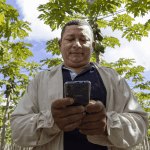Agricultural Insurance + Energy Access: An Innovative Pilot Program Reveals the Value of Bundled Services — And the Need for Cross-Sector Partnerships
Sustainable Development Goal 7 (SDG7) calls for “affordable, reliable, sustainable and modern energy for all” by 2030. But this goal will not be achieved by thinking about energy alone. A holistic approach is necessary, leveraging partnerships and cross-sector innovation to create sustainable energy solutions for last-mile consumers, with a focus on improving their climate resilience.
One of the biggest challenges facing these consumers is affordability. Through our work, Bboxx — a leading distributor and pay-as-you-go financier of solar energy products — has identified that agricultural income is a core contributor to household income for our customer base. Customers typically rely on more than one source of income, and a drop in any of these sources will stress the household and drive affordability challenges. As a result, it is natural to expect that agricultural yield and market prices will influence how affordable our solar energy products are to a household.
While our pay-as-you-go financing model for solar energy has reduced barriers for consumers with limited or unstable income, they are still taking on a financial obligation that needs to be met. If a drop in income leads to an affordability issue, in the worst case, those customers will be unable to keep up with their payments, they’ll default, and their products will be repossessed. This is not only bad for our customers and for Bboxx itself, it’s bad for the global effort to achieve universal energy access.
Fortunately, there are solutions that can improve income certainty and address the issues households face in such situations. It is possible to mitigate risk through insurance, and this has been done in agriculture and various other capacities for many years. However, this solution is also quite complex. Insurance is tricky to understand, it can be costly, and its value can be easily misunderstood — especially among consumers who are unaccustomed to it. It’s also incredibly challenging to distribute insurance to last-mile consumers, and equally hard to manage the claims process.
a pilot program brings agri-insurance to energy customers
Last year, Bboxx launched a partnership with Pula, an agri-insurance technology company, to tackle these challenges. The two companies are working together to explore how providing income protection insurance to thousands of agricultural families in Kenya can increase energy access. The collaboration was possible with the support of Shell Foundation and the UK government’s Foreign, Commonwealth and Development Office.
Through the partnership, Bboxx and Pula piloted an innovation, in which over 4,000 Bboxx customers were provided subsidised climate protection through Pula’s specially designed agricultural index insurance. This coverage was offered to farmers across 12 counties in Kenya, whose focus crops were maize and beans.
The pilot happened in the context of a historic climate-related crisis in the country. In recent years, Kenya has witnessed one of the worst droughts on record, with consistent failure of short and long rains over a period of more than three years escalating food insecurity, poor harvests and loss of livestock. For households, this has put enormous pressure on the ability to pay for basic food. According to UNICEF, over the course of 2022 the number of Kenyans requiring humanitarian aid almost doubled to 4.5 million people. The situation highlights how climate change — the principal driver behind these extreme weather events — is impacting marginalised populations whose contribution to atmospheric carbon levels is negligible. It also shows how the climate crisis is making it even harder for these populations to afford to make sustainable choices, such as adopting clean energy solutions.
To address these issues, Pula offered Area Yield Index Insurance through the pilot program, which covered all risks that affect yield — typically involving drought and pests. The coverage protected Bboxx customers in the event of a climate-related crop failure that resulted in lower-than-expected agricultural yields during the season. Under this coverage, the 12 counties in the pilot were divided into agro-ecological zones (AEZs) based on historical rainfall, temperatures and average historical yield data, among other parameters. At the end of the season, trained local enumerators measured yield levels for each AEZ: With this information, farmers received compensation wherever yields in a specific AEZ were below a predetermined trigger level.
The climate protection paid out for the insured customers in areas where agricultural yields had fallen below historical thresholds, as identified by the ongoing sampling. In the pilot, payout was triggered when yields fell to 70% or less of the expected yields for the regions, with the amounts based on how much the yields fell short of each region’s historical averages. According to an independent survey conducted by an external contractor, two thirds of these customers experienced payment difficulties, with women and middle-aged people more likely to struggle. Among the impacted customers, 7% reported facing default on their solar loans in the six-month pilot period — though the yield insurance prevented formal default and the repossession of customers’ solar products. The climate protection payments were made directly to Bboxx, and we were then able to apply these funds as a credit on the customer’s account.
This support was a relief to customers, as explained by Justus Mucyo, Managing Director of Bboxx Kenya: “SDG7 is at risk with the increased impact of climate change and the state of African economies post COVID-19. As a result, the last-mile customers which Bboxx has chosen to serve pay the biggest price and are at risk of being left out. Droughts can easily send a household above the poverty line back into poverty, and instruments to help them get through those times and be prepared for the future are definitely necessary.”
How Cross-Sector Partnerships Can Boost Energy Access
This pilot program demonstrates what can be achieved by cross-sector partnerships, and how they can benefit all stakeholders. Both partners brought different competencies to our collaboration: Bboxx facilitated access to our customer base, packaging the insurance offer to these customers by leveraging our deep, data-driven understanding of their individual needs. Pula provided expertise in curating the insurance protection, and monitoring conditions through yield sampling across the growing season. It also brought on board the development agency partner, Shell Foundation, which helped fund part of the premiums by offering subsidies extended to the farmers: Due to the support of the various partners, farmers did not have to pay anything for the insurance coverage in the pilot.
The program also demonstrates how Bboxx and Pula are leveraging data and technology to empower low-income households and protect their livelihoods. Participating customers benefited from increased security and peace of mind in otherwise difficult circumstances. An average of $26 per customer was paid out in the areas most affected, with some customers receiving up to $50, providing essential support that allowed them to continue benefiting from their energy services. In the process, Bboxx developed more trust with our customers, increasing their satisfaction while also de-risking payment and strengthening our customer portfolio. We have observed an average drop of 2% in default rates in the affected areas over the pilot period. Meanwhile, Pula has increased distribution and reduced administration expenses (i.e., the cost of assessing and paying out claims) for individual customers, as it paid customers via credits offered through their existing financial relationship with Bboxx. Importantly, both companies have generated learnings that can enable us to refine and improve the offer beyond the pilot program, with the goal of eventually offering subsidized yield insurance to customers on an ongoing basis.
For solar providers, the innovation explored in this program shows how insurance can improve solar customers’ overall resilience to climate-related challenges, which is necessary to increase energy access. For insurers, the program highlights how the challenges of distribution and managing consumer expectations can be addressed through bundling insurance with other beneficial products. Among the customers interviewed in a post-pilot survey, over 50% expressed interest in buying the insurance offer as a paid product. However, 70% had no prior experience with insurance, highlighting the significant knowledge gap that would need to be addressed if this product were developed. Further, it is also necessary to find a model that makes insurance affordable for customers, through bundling the offer with Bboxx services. More support is also needed through risk-tolerant funding, enabling further pilots that refine this sort of offer, making these innovations affordable and bringing them to scale. Despite the challenges, Bboxx and Pula are committed to scaling our partnership to help even more low-income households, with an incremental approach that targets 200,000 existing customers in Kenya through another, larger pilot program.
As the world faces the escalating challenges of climate change and growing economic inequality, partnerships like Bboxx and Pula’s are crucial. By focusing on building customer resilience — a fundamental part of protecting their livelihoods — these partnerships can enable vulnerable communities to continue benefiting from products that address the SDGs. It has become clear that the focus of energy access efforts has to be on building customer resilience as much as offering climate-adaptive solutions. It is only through such an approach that all stakeholders, including customers, can benefit sustainably. As more companies adopt this sort of approach, we can move toward a world where energy access is a fundamental right for all, and where vulnerable people are protected against the unpredictable nature of climate change.
Note: Bboxx would like to thank the following people for contributing to this successful partnership and subsequent article: from The Shell Foundation, Wim Jonker Klunne, Business advisor, and Gary Almond, Head of Communications and Advocacy; from Pula Advisors, Rose Goselinga, President and Co-founder, Cedric Todwel, Commercial Director, and Faith Kinyanjui, Senior Partnerships Project Manager; and the entire Bboxx Kenya team, in particular Anthony Mabonga and Wanjiru Kinyanjui.
Anshul Patel is the Director, Global Partnerships and Investor Relations at Bboxx.
Photo courtesy of International Maize and Wheat Improvement Center.
- Categories
- Agriculture, Energy, Finance, Technology



